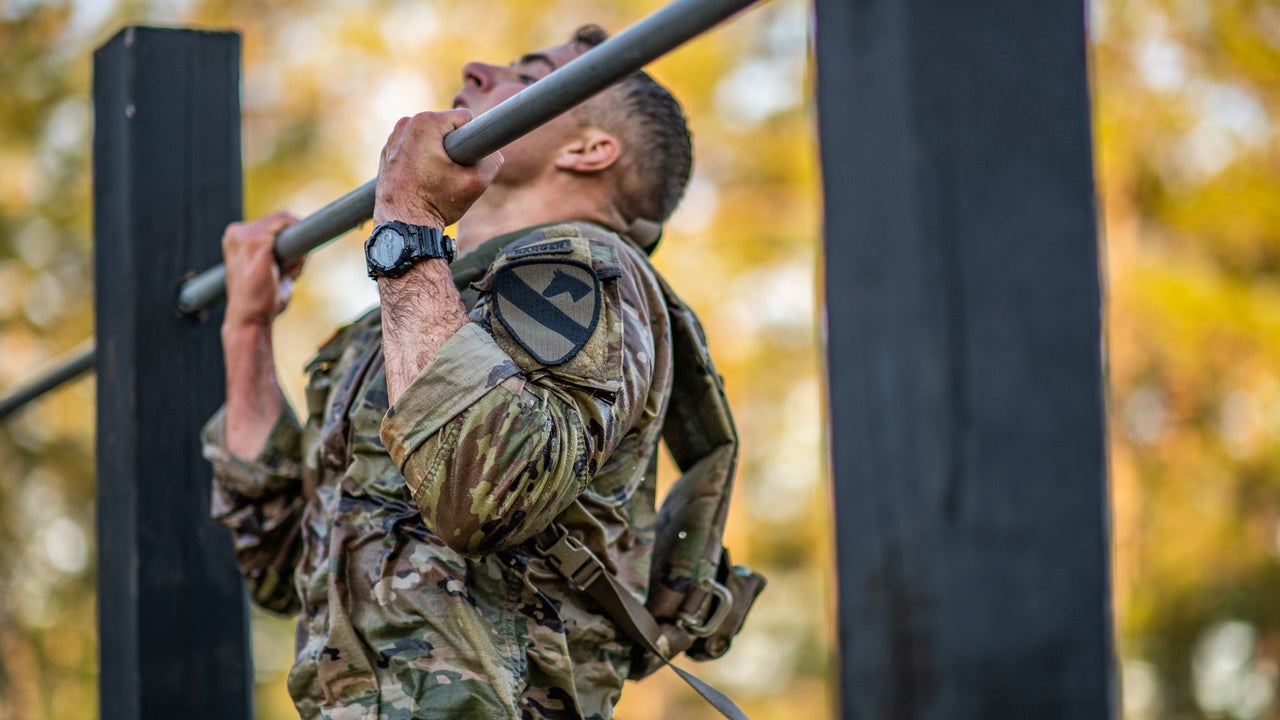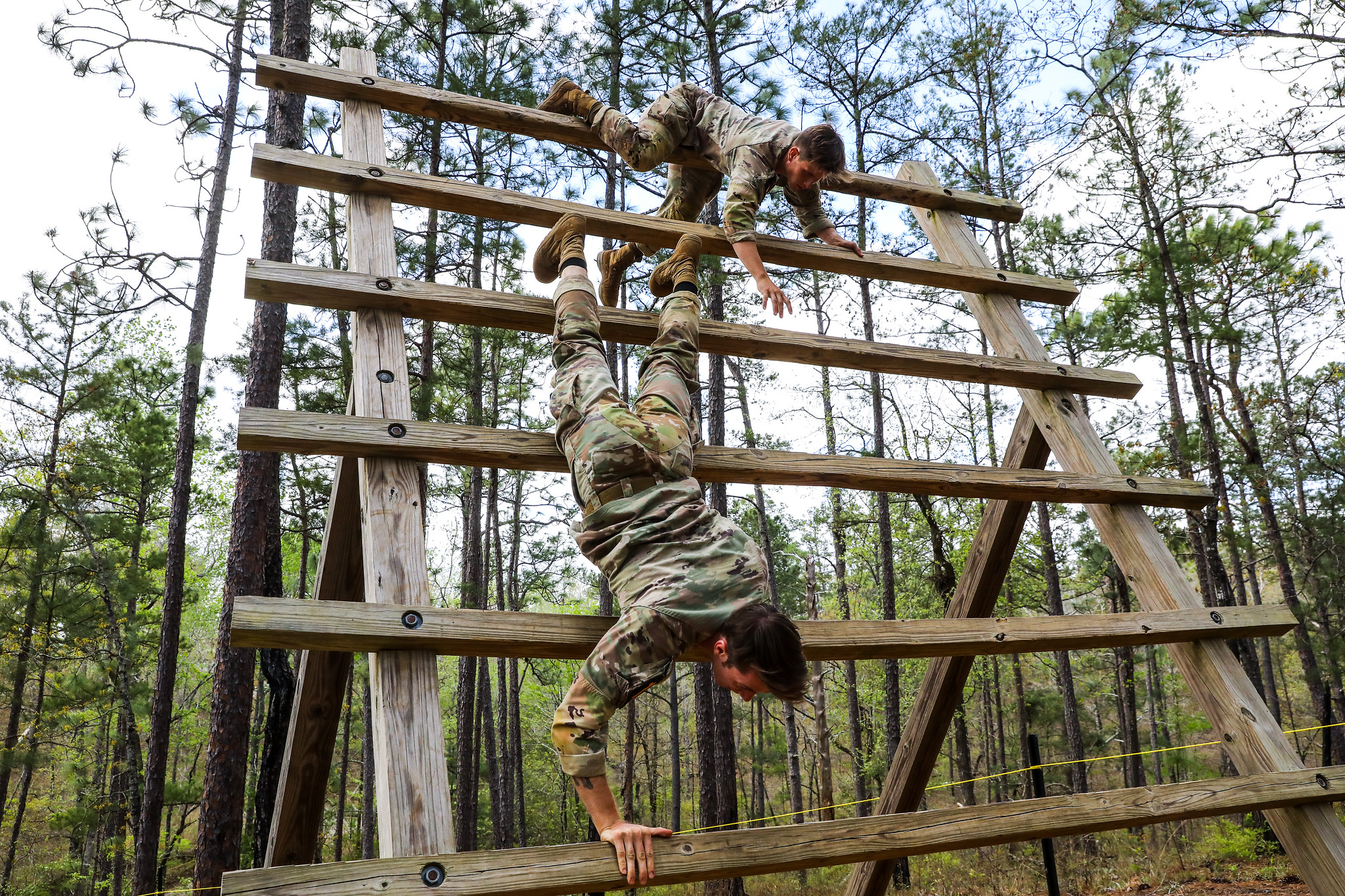How to train like an elite Army Ranger, according to a Best Ranger coach
“I think more and more people are accepting that the mental game is just part of performing well."

The soldiers who compete at the Army’s annual Best Ranger Competition are some of the toughest out there. The three-day competition puts soldiers’ physical abilities to the test with seemingly non-stop shooting, running, and rucking events, as well as various skill tests including grenade throwing and rope climbing.
The physical demands are overwhelming. But according to one Best Ranger trainer, mental training is just as important.
Nate Wolch, a civilian cognitive performance specialist with the 1-2 Stryker Brigade Combat Team, 7th Infantry Division, helped prepare soldiers for the Best Ranger Competition at Fort Benning, Georgia. He told Task & Purpose that “a lot” of what the Best Ranger competitors are doing is internal. While they’re certainly pushing themselves physically to the limit, it’s critical that competitors are mentally tough as well to be able to withstand the draining three-day competition.
“We talked about training mental toughness and what that actually looks like, and when they’re pushing up against those walls in training, what are they doing to prepare themselves to actually continue to push through that? To fight it, fight the discomfort and the pain rather than running from it?” Wolch said.

Subscribe to Task & Purpose Today. Get the latest in military news, entertainment, and gear in your inbox daily.
So while the soldiers were doing intense physical training to get ready for different events in the competition like the combat water survival assessment or ruck march of an unknown distance, they were also working on breathing control and techniques with Wolch, and doing “mindfulness training” or guided meditation. Even just 12 minutes a day of mindfulness over the course of four weeks can “start reshaping different structures in the brain,” Wolch said.
At the time Task & Purpose was talking with Wolch, soldiers were cycling through the Darby Queen, a brutally intense obstacle course that has competitors running up and downhill, climbing structures, shimmying across ropes, and balancing on beams. Wolch said that his soldiers were probably working on their breathing control at that moment, in order to “initiate that recovery” as quickly as possible.
Wolch, who has a master’s degree in sport and performance psychology and is working on a doctorate in cognitive psychology, said those breathing techniques are all about “manipulating the inhale to exhale ratio,” and breathing slower to lower their heart rate. They learned how to exhale longer than they inhale, starting with a four-second inhale and then exhaling for seven seconds. They built up their lung capacity from there, Wolch said.
“That’s a thing the guys know like the back of their hand,” he said. “I can just give them a nod and they know exactly what to do at this point.”

But it wasn’t just mindfulness training or breathing techniques. Wolch said the soldiers also learned how to manipulate each other — kind of. They had to learn when their partner needed space and when they needed to be pushed; what is their “ideal level of energy” or anxiety that would result in their partner performing better. And when soldiers have only their partners to lean on throughout the Best Ranger Competition, it’s crucial that they know how best to help each other.
Much of what Wolch mentioned falls in line with the Army’s holistic health and fitness initiative, which focuses on a soldier’s total health — getting enough sleep, eating well, mental and spiritual wellness — not just physical. The Army is still rolling that out, with the intent of embedding physical and occupational therapists, dieticians, strength and conditioning coaches, cognitive performance experts, and holistic health and fitness trainers in brigades throughout the force.
Wolch said at his brigade, they’re still determining what works best, and they’re using the training for Best Ranger as a framework for how to apply it across the board to the rest of the unit.
Of course, not every soldier needs to train like Best Ranger competitors train — many of the soldiers at the competition described weeks of relentless focus on physical training and strict diets. But training in a way that focuses on the mental aspect just as much as the physical is something Wolch said he’s having to convince people of less and less.

“I think more and more people are accepting that the mental game is just part of performing well,” Wolch said. “Especially people who have been to Ranger School or done anything difficult and failed. It’s usually because of a mental mistake, a lack of focus, a lack of confidence, a lack of just translating their hard work into the actual performance. It’s almost always something mental that gets in their way.”
While some of the “old school guys” can be “much harder to convince,” Wolch said, he typically points to professional sports teams and organizations as an example of things working in the right direction. “There’s multiple sports [psychologists] on every MLB baseball team, every NBA roster, every NFL locker room,” he said. “They’re all over the place.”
But for Wolch it’s also personal. He said he was a boxer, and he recalled that despite working “really hard” in training, all of his preparation would disappear the second he stepped into the ring because of his nerves. He learned that you can’t think about the what-ifs, or the potential outcomes of a fight. You have to be in the moment, and to do that, you have to train mentally.
“That’s something that doesn’t happen by accident,” he said. “You actually have to work at training that skill.”
The latest on Task & Purpose
- Russian troops are proving that cell phones in war zones are a very bad idea
- Air Force disciplines C-130 crew for ‘unplanned’ landing to pick up motorcycle in Martha’s Vineyard
- Commandant walks back possibility of Marines skipping boot camp
- Air Force pilots explain why the F-22 Raptor is a ‘beast’ in aerial combat
- Sailors from my old ship are dying by suicide. I may know why
Want to write for Task & Purpose? Click here. Or check out the latest stories on our homepage.
